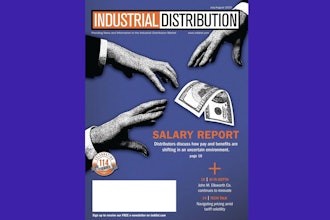
My answer to the question posed in this headline is "no."
In most cases, salespeople should not be able to view the revenue associated with individual accounts they’ve won?
This is interesting for two reasons. First, arguing my (seemingly untenable) position will expose a serious design flaw in most industrial organizations. And, second, this discussion highlights that our intuition can lead us seriously astray when we are operating in complex environments (dynamic systems).
Let’s start with a thought experiment.
Freddy, a salesperson for the great Prestige Paints corporation, sells a paint system to a small chain of hardware stores. Under the terms of the deal, the chain will stock Prestige Paints products exclusively, and Prestige Paints will supply capital equipment, training, and other services, along with special pricing and payment terms.
As the deal is closed, the question on everyone’s lips (most notably, Freddy’s) is, what is the value of this deal? How much value has been added to the corporation by Freddy’s efforts?
So Freddy watches the numbers. In month one, the deal generates $0 in revenue. In month two, zero. In month three, finally, $4,322 in revenue — generated because the first store in the chain is about to come online and has placed a small order for some peripheral paint-related products.
As time goes on, and as more stores come online, the revenue resulting from this deal begins to build and it becomes clear to everyone within Prestige Paints that this deal was a significant win for the corporation.
Now, by the time the value of this deal becomes obvious to all (including Freddy), one of two things will have occurred. Either Freddy will have handed off the onboarding and maintenance of this hardware chain to operations and moved on to pursue more deals, or Freddy will have embedded himself in the delivery of the promises he made, meaning that he has now been transformed into part customer-service rep, part technician, and part project manager.
In the former case, Freddy is conflicted by the hardware chain deal. He feels like his contribution was grossly underestimated when the deal was first won and it is unlikely to be recognized now that the chain has become a house account.
In the latter case, if Freddy has not devolved into a salesperson-in-name-only by now, it will only take one or more deals like this for Freddy’s (functional) sales career to be a distant memory.
So, let’s assume that the leadership of the great Prestige Paints corporation is intelligent and well-intentioned. Let’s assume that they have designed their organization so that the sales department focuses on selling (winning new business) and that operations takes full responsibility for the fulfillment of terms of the deals that sales has won.
If we proceed from this assumption, it would clearly be idiotic for Prestige Paints to allow Freddy (and others) to attempt to infer the value of the hardware chain deal from the monthly bookings. Obviously, this would result in different parties arriving at unpredictable and wildly divergent conclusions.
The more rational approach would be to recognize that, from an economic perspective, the hardware chain deal is an annuity (a series of payments stretching into the future). Consequently, the value of the deal is not the sum of the historical bookings — it’s the net-present-value of the future cash flow.
Think of it this way: if you value the deal by summing the bookings, the deal is worth nothing at the point of signing and it increases in value over time. However, in reality, the deal is at its most valuable at signing and it diminishes in value as those potential revenues are converted into actual cash in the bank, assuming the annuity has a finite term.
So here’s what, I argue, should have transpired: when Freddie won the hardware chain deal, the win should have been celebrated and the value of the deal should have been calculated at that point by making reasonable assumptions about the average monthly spend and the number of years for which the account could be retained.
After those celebrations, the account should have been handed over to operations, who should have assumed responsibility for exploiting the potential value resident in that account.
Moving forward, monthly bookings are important only because they are a measure of the performance of operations. They should not be shared with sales because they misrepresent the value of the hardware chain account.
In the modern industrial organization, most accounts resemble Freddy’s hardware chain deal. Customers do not change vendors often and, when they do, it tends to be for strategic reasons. This means that almost all accounts are annuities and should be valued and managed as such.
The contribution of sales should be calculated by summing the net-present-value of deals won during the reporting period. Revenue is important, of course, but it’s an operations metric, not a sales one.
Justin Roff-Marsh is the founder and president of Ballistix and the author of The Machine: A Radical Approach to the Design of the Sales Function.






















